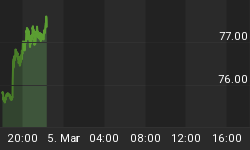Rightly, the students of Austrian Economics have laid the blame for the current economic crisis squarely on the doorstep of the Keynesian policies of governments and central banks. However, in this case, there are other culprits involved, most notably the former titans of financial services. During this decade, major international money center banks from Wall Street to London and even to Zurich displayed unimaginable greed, reckless risk taking and gross negligence. Depositors, borrowers and shareholders should be questioning whether any major financial institution will ever again be worthy of their trust.
The original sin of our current downfall can be traced back to the mid-20th century when politicians broke the fundamental financial disciplines guaranteed by gold-linked currencies. More recently, politicians "encouraged" banks into "social lending" for low-income housing, which led to the sub-prime problem. Also it was politicians, like Bush-Greenspan, who injected vast amounts of liquidity into the world economy, creating the largest asset boom in history.
However, the banks compounded these errors with their gleeful irresponsibility. They lobbied Congress to abolish the Glass-Steagall Act of 1933, which was designed to prevent a re-run of the financial fiasco of the Great Depression. The consolidation enabled by the repeal of Glass-Steagall created banking behemoths that had the political protection of being "too big to fail".
Driven by greed, many banks financed their increasingly large long-term property loans with short-term funds. Unsatisfied even with those high returns, they heavily invested in so-called real estate "securities", to which risk was never properly assigned. To make even further gains, banks became "players" in the vast, virtual and unregulated derivatives market.
Conscious that their actions might be questioned by prudent observers, the banks then hid many of their reckless investments. Building on the "advancements " pioneered by Enron at the beginning of the decade, many banks made liberal use of "off-balance sheet" entities to hide losses and exaggerate profits. Some used "off-shore" entities to further conceal their handiwork.
Meanwhile, banks began squeezing their retail clients with new charges for every conceivable service that was previously offered free in return for the use of depositors' funds. Furthermore, as staffs became overloaded, administrative errors became commonplace.
When the sub-prime bubble burst, the banks were less-than-honest in showing the "true and fair" condition of their accounts. Like all insiders, they knew the "game" and became distrustful of fellow banks. Inter-bank credit collapsed, heralding a credit crisis that threatened to throw both national and international economies into depression.
Forced to ultimately accept write-downs of assets, some banks began to show serious losses on current account. As the truth leaked out, the prospect emerged of a run on the banks and a catastrophic failure of the international financial markets. Governments around the world consulted in near panic. To salvage the banks and financial system, taxpayers were forced to inject cash into the banks to avoid an immediate economic meltdown.
That is all history. But has the corruption, greed, and malfeasance which pervaded the banks gone away? It does not appear so.
Saved from bankruptcy by taxpayer funding, certain major banks continued paying dividends to shareholders and massive bonuses to executives. Some maintained huge expenditures on corporate jets and executive "sales" outings. In the face of mounting public outrage, these policies reflected little change in behavior or contriteness for bringing the American and world economies to their knees.
American banks already have foreclosed on a vast number of homes. But, they have allegedly have withheld large numbers of houses from sale, lest a low price force them to write down their remaining property loans still further. Similarly, banks hold vast amounts of "toxic" mortgage-backed securities on their books that they refuse to sell given the low prices the debt would fetch on the open market. This so-called "shadow inventory" still overhangs the property market. It distorts property values to the upside and clouds the viability of many banks.
Instead of facing the music that they so consistently avoided in the past, banks prevailed upon the authorities to rescind the so-called "mark to market" obligation for mortgage-backed securities. This rule change allows the irresponsibility to continue.
Until the banks come clean, show their true numbers, and take honest recovery action, it is unlikely that trust will be restored in the property and credit markets. If we are to begin the journey toward a robust economy, establishing trust between all market participants must be the first step.
For a more in-depth analysis of our financial problems and the inherent dangers they pose for the U.S. economy and U.S. dollar, read Peter Schiff's newest book "The Little Book of Bull Moves in Bear Markets." Click here to order your copy now.
For a look back at how Peter predicted our current problems read the 2007 bestseller "Crash Proof: How to Profit from the Coming Economic Collapse." Click here to order a copy today.
More importantly, don't wait for reality to set in. Protect your wealth and preserve your purchasing power before it's too late. Discover the best way to buy gold at www.goldyoucanfold.com. Download Euro Pacific's free Special Report, "Peter Schiff's Five Favorite Investment Choices for the Next Five Years", at http://www.europac.net/report/index_fivefavorites.asp. Subscribe to our free, on-line investment newsletter, "The Global Investor" at http://www.europac.net/newsletter/newsletter.asp. And now watch the latest episode of Peter's new video blog, "The Schiff Report", at http://www.europac.net/videoblog.asp.















